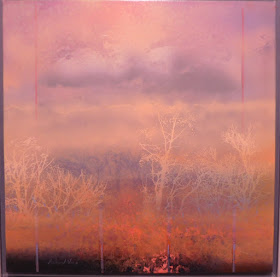An Eloquent Revelation of Light
 |
| Horizon I |
 |
| Red Window II |
 |
| Concerto in Blue V |
 |
| Amber Concerto |
 |
| Solar Concerto |
By Tom Wachunas
“When you are painting a landscape, assume
the painting is real and the landscape is an illusion.” -Walter Darby Bannard
“…He has given his inborn gift to nature.
He has celebrated her minutiae and her grandeur, her openness and her mystery.
Is not every serious celebration an acknowledgement of transcendence?” –
Dr. Irma B. Jaffe, Professor Emeritus, Fordham University, from her catalogue
essay, “Picturing Light: The Paintings of Richard Vaux”
EXHIBIT: Picturing Light: The Paintings of Richard Vaux
/ through Oct.6, 2019 / At Massillon Museum STUDIO M Gallery, 121
Lincoln Way East (Ohio 172) in downtown Massillon / Viewing hours are Tuesday
through Saturday, 9:30 a.m. to 5:00 p.m. and Sunday 2:00 to 5:00 p.m. A visit
to the Massillon Museum is always free.
Call the Massillon Museum at 330-833-4061 for more information.
The paintings by
Hudson, Ohio-based Richard Vaux are deeply poetic visions embracing the
stylistic legacy of Romanticism, Impressionism, and Abstract Expressionism all
at once. Vaux is a conjurer of the highest order. He doesn’t just make
beautiful pictures. He creates experiences. He turns natural light into a
practically living thing.
Let me clarify. The
paintings – most of them acrylic on vinyl - aren’t ‘pictures’ in the
conventional sense. They’re not static configurations of representational
lines, shapes, and colors on a single 2D plane, though from several feet away, they do appear to have a
certain photographic flatness about them.
But that apparent
flatness progressively dissipates and takes on real dimensionality as you move in for a closer
look, just as you would to peer through a window at a spectacular atmospheric
event. These ephemeral skies open up
ever so slowly. Their intensely subtle variations in chromatic tonalities and
soft textures seem to undulate, shift, shimmer or fade as if stirred by a
zephyr. So no, these aren’t really ‘pictures’ after all. They’re tangible
actualities in their own right. They expand and contract. They breathe.
This mesmerizing
effect can certainly be attributed to Vaux’s unusual practice of painting on
vinyl. While I’m not exactly sure of his precise method, the vinyl doesn’t
appear to be a fully transparent, glass-like plastic. It has instead a slightly
frosted look, giving the imagery a misty translucency, sometimes with passages
of very tiny, amorphous surface irregularities – gentle ripples, or bubbles. While
there’s paint on the topmost surfaces, there seems to be paint on the reverse
sides of the vinyl as well, and maybe another painted vinyl plane underneath
that one. Whatever his process might be, Vaux’s facile, harmonic manipulations
of organic shapes and mellifluous hues imbue his iconography with a compelling
spirituality. Articulating light as the palpable, moving substance of spirit.
Additionally,
there’s a mystical element here in the way Vaux often incorporates delineated,
geometric (rectangles, grids, circles) planes or frames with his naturalism, perhaps
suggesting an underlying (or overarching?) system or structure. Light as the
architecture of the cosmic ether? I’m reminded of an observation by English
landscape painter, John Constable (1776-1837): “Painting is a science, and should be pursued as an inquiry into the
laws of nature. Why, then, may not landscape painting be considered as a branch
of natural philosophy, of which pictures are but the experiments?”

No comments:
Post a Comment